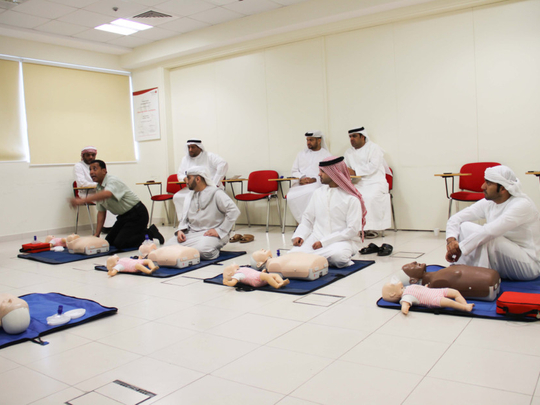
Dubai: Dubai Corporation for Ambulance Services (DCAS) has called on residents to become certified first-aid volunteers in case they are faced with an emergency situation that requires immediate assistance.
The corporation has long opened its doors for residents to apply for their first-aid training programme which provides a full week of training, including a certification card that legally allows them to rush to the aid of people anywhere at any time before the ambulance and paramedics arrive.
However, DCAS has noticed a shortage in the number of first-aid volunteers in Dubai and hopes that more people step up to serve their community.
A spokesperson from DCAS told Gulf News earlier that a life can be saved within seconds at times if the correct first-aid is performed. However, if the person carrying out the first-aid procedure does not have a certification, by law, they are not allowed to administer it and can get in trouble if something goes wrong.
This comes in light of an earlier incident in June this year when a Sudanese man, who was not certified to perform first-aid but had been trained in Sudan on how to perform it, took the risk to save an Egyptian man he saw choking on a piece of candy on the road. The Sudanese man managed to save the man from dying of suffocation and told Gulf News that it was impossible to wait for the paramedics to arrive.
This is why members of the community should consider taking the training course because there will be more people available to immediately administer first aid when such incidents happen, said Jamal Eisa Al Rowaie, Director of The Training and Continuous Education Department and Acting Director of the Operations Department.
“Volunteers will have enough knowledge and skills to respond to cases that require immediate assistance. They will be trained in how to instantly deal with various situations and injuries such as fractures, heat strokes and when someone is bleeding. They are trained on how to perform Cardiopulmonary Resuscitation (CPR) and other life-saving techniques until the ambulance and paramedics reach the scene,” said Al Rowaie.
The course also includes teaching volunteers how to call an ambulance, describe the situation and locate the place of the incident within seconds, he added.
Upon receiving the certification after a full week of training — two hours every day — “volunteers will be able to step in and help anyone around them at any time, whether it is their neighbour, their family, or a person on the road”, he said.
A card proving that they are certified to perform first-aid must be carried with them at all times.
“Having a large number of first-aid volunteers ready to intervene and support their community reflects how committed our society is towards each other and people’s willingness to give back to the community they live in by applying the skills they have learnt to save others,” he said.
Al Rowaie confirmed that they only receive 2,000 people a year for the first-aid certification and that the people “who mostly apply for it come from jobs that require knowledge in first-aid, such as employees in the hospitality sector and engineers working in the field”.
“Residents are encouraged to contact DCAS’s training department, either by email, by telephone or in person to learn more about what courses we offer and to apply for the training,” Al Rowaie said.
Al Rowaie noted that DCAS has been continuously conducting lectures, workshops and campaigns inside and outside their offices to encourage residents to gain some knowledge and skills in the field. “We also have a team that trains and teaches employees working in public and private companies how to perform first-aid and how to respond to injuries and illnesses within their premises.”












